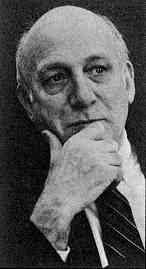 WHO NEEDS
WHO NEEDSPERSONAL
COMPUTERS?
by J. Presper Eckert
J. Presper Eckert was the chief engineer on ENIAC I. He is currently vice-president and technical assistant to the president of Sperry Computer Company.
I must confess that I don't own a personal computer. I have no reason to. I suppose I could use a computer for my hobby, electronic musical instruments, and conduct research on how to generate an accurate replica of a piano note (today's electronic pianos lack warmth in their tones). But I would need a pretty fast computer to handle the sampling of a note's characteristics in a reasonable amount of time. I may just wait for the next generation of personal computers based on the 32-bit microprocessors now appearing from a number of manufacturers.
We've come a long way since the day when Dr. Howard Aiken, designer of the pioneering Mark series of computers at Harvard, could say that just a half-dozen electronic machines would be enough to fulfill the world's computational needs (a statement he later retracted). On the other hand, I remember my late colleague John Mauchly talking about the importance of personal computers long before they existed.
During the late 1950s I was involved in trying to build what could now be called a personal computer, probably the first such machine to fit on a desktop. We used hundreds of magnetic core amplifiers and diodes, a few transistors and tubes, and a motor-driven drum for memory storage. The same motor powered a flyprinter, which typed the computer's output onto a moving strip of paper. Unlike the first microcomputer systems, which came later, our machine included a keyboard for easy input. We figured we could sell our Desk Computer for $5,000. Some insurance firms expressed interest, but our executives just couldn't see business need for that small a computer.
I find a lot of bunk surrounding today's personal computers. Like the term "user-friendly." Just what does it mean? When we were working on ENIAC I, we wrote an assembler so the machine could do some of its own bookkeeping and we could program it more easily. The vast majority of personal computer users will never do any programming, so this development may not seem especially user-friendly. But anyone who has ever had to program in machine code would find an assembler a most agreeable companion.
Often I am asked whether computers have had a dehumanizing influence on society. This may be so in some cases, but mostly it just isn't true. If anything, computers can free you from tedium. And they allow you to exercise your individuality. You can go into a dealer's showroom and order a car with your choice of colors and options, thanks to a computerized assembly system. This is a far cry from Henry Ford's Model-T and its choice of any color as long as it was black.
There are problems, of course. Computers are replacing humans on the assembly line, but bolt-stuffing a machine chassis, for instance, could hardly be thought of as a particularly humanizing activity. Progress always brings problems, and we should be working on solutions to those problems. You've got to be for progress or go back to eating bark in the forests.
Who needs personal computers? Society at large. Overall, personal computers are the greatest development since the first electronic computers. They are important not for their individual use, but for their long-term educational effect. Home computers will surely awaken some young geniuses who will make a tremendous difference in the future. It's this long-shot effect, this gamble on the next step in our evolution, that defines our real need for personal computers.
Return to Table of Contents | Previous Article | Next Article

